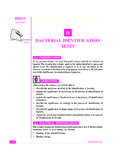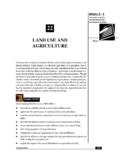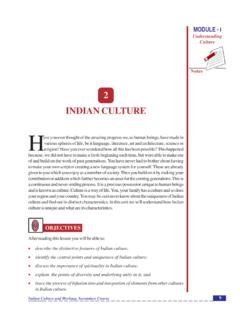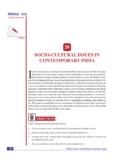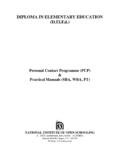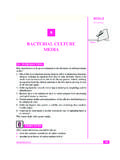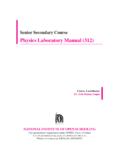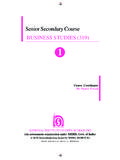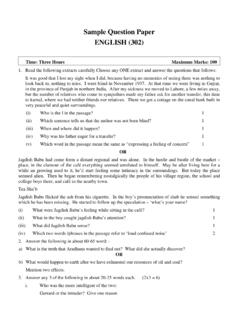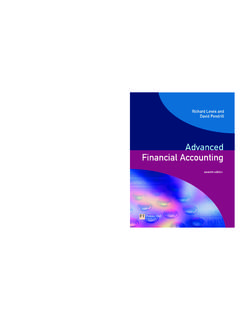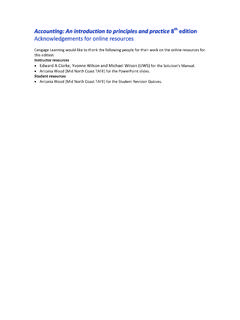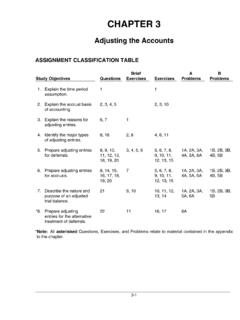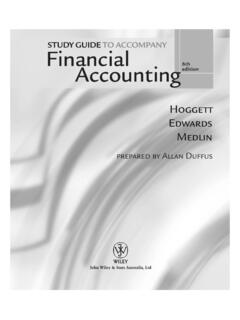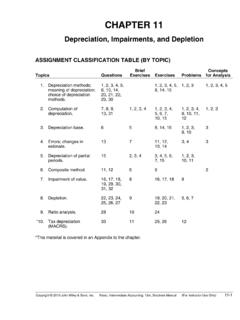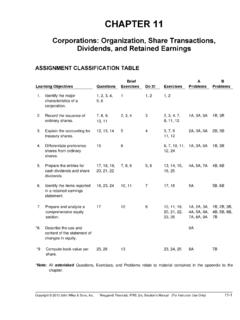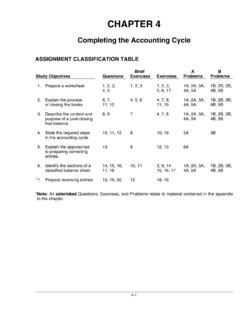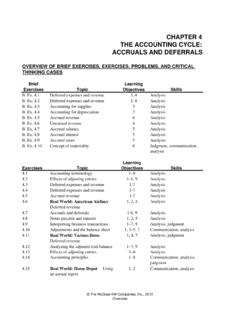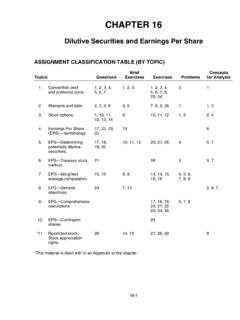Transcription of BASIC ACCOUNTING PRINCIPLES
1 DIPLOMA IN INSURANCE SERVICESMODULE - 1 NotesBasic ACCOUNTING PRINCIPLES Business Environment 605 BASIC ACCOUNTING INTRODUCTIONWe have studied economic activities which have been convertedinto business activities. In business activity a lot of give &take exist which is known as transaction. Transaction involvestransfer of money or money s worth. Thus exchange of money,goods & services between the parties is known to have resultedin a transaction. It is necessary to record all these transactionsvery systematically & scientifically so that the financialrelationship of a business with other persons may be properlyunderstood, profit & loss and financial position of the businessmay be worked out at a particular date.
2 The procedure to recordall these transactions is known as Book-keeping .In other words the book keeping may be defined as an activityconcerned with the recording of financial data relating tobusiness operations in an orderly manner. Book keeping isthe recording phase of ACCOUNTING . ACCOUNTING is based on anefficient system of book is the analysis & interpretation of book keepingrecords. It includes not only the maintenance of accountingrecords but also the preparation of financial & economicinformation which involves the measurement of transactions& other events relating to are various terminology used in the ACCOUNTING whichare being explained as under: -1) Assets.
3 An asset may be defined as anything of use inthe future operations of the enterprise & belonging toMODULE - 1 Business EnvironmentNotes 61 BASIC ACCOUNTING PrinciplesDIPLOMA IN INSURANCE SERVICESthe enterprise. , land, building, machinery, cash ) Equity: In broader sense, the term equity refers to totalclaims against the enterprise. It is further divided intotwo Claim - Capitalii. Outsider s Claim LiabilityCapital: The excess of assets over liabilities of theenterprise. It is the difference between the total assets& the total liabilities of the enterprise.
4 ,: if on aparticular date the assets of the business amount to lakhs & liabilities to Rs. 30,000 then the capital onthat date would be ,000 : Amount owed by the enterprise to the to all others except the owner. ,: trade creditor,bank overdraft, loan ) Revenue: It is a monetary value of the products or servicessold to the customers during the period. It results fromsales, services & sources like interest, dividend & ) Expense/Cost: Expenditure incurred by the enterpriseto earn revenue is termed as expense or cost.
5 Thedifference between expense & asset is that the benefit ofthe former is consumed by the business in the presentwhereas in the latter case benefit will be available forfuture activities of the business. , Raw material,consumables & salaries ) Drawings: Money or value of goods belonging to businessused by the proprietor for his personal ) Owner: The person who invests his money or money sworth & bears the risk of the ) Sundry Debtors: A person from whom amounts are duefor goods sold or services rendered or in respect of acontractual obligation.
6 It is also known as debtor, tradedebtor, accounts ) Sundry Creditors: It is an amount owed by the enterpriseon account of goods purchased or services rendered or inrespect of contractual obligations. , trade creditor,accounts IN INSURANCE SERVICESMODULE - 1 NotesBasic ACCOUNTING PRINCIPLES Business Environment OBJECTIVESAt the end of this lesson you will be ablezTo maintain the books of accountszTo prepare the annual ACCOUNTING CYCLEA fter taking decisions such as selecting a business, selectingthe form of organisation of business, making decision aboutthe amount of capital to be invested, selectingsuitable site,acquiring equipment & supplies, selecting staff.
7 Gettingcustomers & selling the goods etc. a business man finallyresorts to record all types of business organisations, transactions such aspurchases, sales, manufacturing & selling expenses, collectionfrom customers & payments to suppliers do take place. Thesebusiness transactions are recorded in a set of ruled bookssuch as journal, ledger, cash book etc. Unless thesetransactions are recorded properly he will not be in a positionto know where exactly he following is the complete cycle of Accountinga)The opening balances of accounts from the balance sheet& day to day business transaction of the ACCOUNTING yearare first recorded in a book known as ) Periodically these transactions are transferred toconcerned accounts known as ledger )At the end of every ACCOUNTING year these accounts arebalanced & the trial balance is )
8 Then the final accounts such as trading & profit & lossaccounts are )Finally, a balance sheet is made which gives the financialposition of the business at the end of the period. Transaction Journal Ledger Trial Balance Balance Sheet Opening Balance Sheet Closing P & L a/c Trading A/c MODULE - 1 Business EnvironmentNotes 63 BASIC ACCOUNTING PrinciplesDIPLOMA IN INSURANCE ACCOUNTING ASSUMPTIONSIn the modern world no business can afford to remain secretivebecause various parties such as creditors, employees,Government, investors & public are interested to know aboutthe affairs of the business.
9 The affairs of the business can bestudied mainly by consulting final accounts and the balancesheet of the particular business. Final accounts & the balancesheet are the end products of book keeping. Because of theimportance of these statements it became necessary for theaccountants to develop some PRINCIPLES , concepts andconventions which may be regarded as fundamentals ofaccounting. The need for generally accepted accountingprinciples arises from two reasons:1)to be logical & consistent in recording the transaction2)to conform to the established practices & proceduresThe International ACCOUNTING Standards Committee (IASC) aswell as the Institute of Chartered Accountants of India (ICAI)treat (vide IAS-I & AS-I) the following as the fundamentalassumptions:1.
10 Going Concern: In the ordinary course accountingassumes that the business will continue to exist & carryon its operations for an indefinite period in the entity is assumed to remain in operation sufficientlylong to carry out its objects and plans. The values attachedto the assets will be on the basis of its current worth. Theassumption is that the fixed assets are not intended forre-sale. Therefore, it may be contended that a balancesheet which is prepared on the basis of record of facts onhistorical costs cannot show the true or real worth of theconcern at a particular date.
